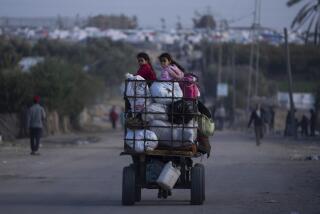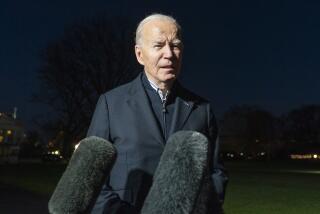U.S. says detainees include key suspects
- Share via
BAGHDAD — The military said Wednesday that it had detained people believed to be “directly linked” to a weekend assault in which attackers ambushed two Humvees, killing four U.S. soldiers and their Iraqi interpreter, and leaving three others missing and presumed captured.
The commander of the region where the attack occurred, U.S. Army Maj. Gen. Rick Lynch, offered details Wednesday of the ambush that portrayed the attackers as coordinated, swift and brutally effective.
Lynch said the eight troops in two Humvees were attacked after they had set up a position, guarded by rolls of razor wire, near a crater caused by previous bombings. The blast site, on a road about 12 miles west of Mahmoudiya, had become a favorite spot for insurgents to plant bombs.
Additional soldiers were at a patrol base about 1,500 feet to the north, Lynch said.
Evidence indicated that the attackers used grenades and other hand-held explosives, and converged from several directions, he said.
Drag marks leading to tire tracks showed that the missing men were pulled from the area to vehicles about 45 feet away.
The military is trying to determine whether the two Humvees were sufficient to guarantee the troops’ protection and whether the patrol had taken necessary precautions. Those precautions would include not being positioned at a spot previously used by U.S. troops, Lynch said.
Lt. Col. Randy A. Martin, a military spokesman, said 679 people were being held for questioning but did not disclose how many of them were suspected of having direct links to the attack.
The Islamic State of Iraq, an insurgent coalition loyal to Al Qaeda, has claimed it is holding the soldiers, but has not provided proof. Terrorism experts have said the group may be attempting to stretch out the agony of its adversary.
“Like all the best terrorists ... they seek to maximize the most effect of an act of violence,” said Bruce Hoffman, a terrorism expert at Georgetown University. “It’s not just putting the knife in, but twisting it slowly.”
Psychological warfare is a crucial tactic to insurgents in Iraq, where the battle is aimed at undermining the U.S. occupation and heightening tensions between Iraqi civilians and American troops, said James Phillips, a Middle East analyst at the Heritage Foundation.
Phillips said Al Qaeda groups knew that an ambush leading to the capture of soldiers could attract more attention than merely killing troops in a bombing.
“It is possible that all of the people were killed and that they took some of the bodies so they could use them as a psychological counter,” he said. “From their point of view, it’s more useful to get their message across that they are still a force.”
A farmer living in Yousifiya, a town a few miles from the ambush site, said a U.S. sniper post had been established a few hundred feet from his house.
“There is no way to communicate even with the next door neighbor because of the sniper,” said the farmer, who would not give his name. He said a U.S. soldier at the post had shot a local man when he went outside and people were being taken away handcuffed, with black hoods over their heads.
Lynch, however, said residents had been generally understanding of the situation.
“Clearly nobody wants to have their freedoms deprived,” he said, but, “I’m not sensing a lot of animosity. They understand why we’re doing what we’re doing.”
The four soldiers killed in the attack were from the 10th Mountain Division in Ft. Drum, N.Y. Their bodies arrived Tuesday at Dover Air Force Base in Delaware.
At a news conference on the base Wednesday, spokesman Lt. Col. Paul Fitzpatrick said searchers were operating under the assumption the missing are alive, “and are either under the control of extremists or, possibly, may be attempting to evade. Either way, our premise is that we assume they are alive unless proven otherwise.”
Elsewhere in Iraq, scores of deaths were reported, including at least 40 in a market bombing Tuesday in a remote town north of the capital, and two people who died after a highly coordinated mortar barrage Wednesday on the Green Zone in central Baghdad. Ten people inside the zone were injured in the second day of mortar attacks on the walled enclave, which is home to the U.S. Embassy, Iraqi parliament and many government installations and residences.
In the northern city of Mosul, five car bombs and 10 roadside devices exploded Wednesday evening, and mortar rounds rained down on a prison in the city center, the provincial police chief reported.
Another police official said four people died and nine gunmen were killed.
Mosul, 225 miles north of Baghdad, lies in an area near the semiautonomous Kurdistan region that has seen increased violence as Kurds and Sunni Arabs vie for dominance.
Mortar attacks struck the southern city of Nasiriya, where clashes erupted between rival Shiite Muslim militias.
*
julian.barnes@latimes.com
Times staff writers Ned Parker, Zeena Kareem, Raheem Salman and Saif Hameed in Baghdad, and special correspondents Ruaa al-Zarary in Mosul and Saad Fakhrildeen in Najaf contributed to this report.
More to Read
Sign up for Essential California
The most important California stories and recommendations in your inbox every morning.
You may occasionally receive promotional content from the Los Angeles Times.














